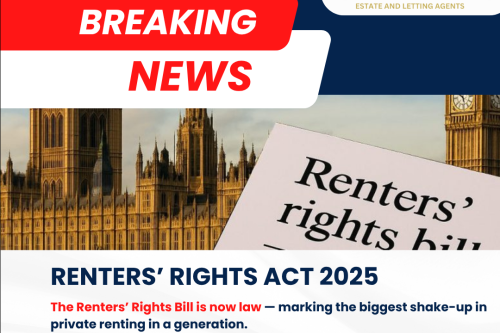- Free Valuation
- Competitive Sales Commission Fees
- Free Mortgage Advice

posted 29th October 2025
The Renters’ Rights Bill 2025, now officially passed into law after receiving Royal Assent, marks the most significant reform to private renting in over three decades. It rebalances the relationship between landlords and tenants, reshaping how properties are let, managed, and regulated across England.
With around 11 million private renters and 2.3 million landlords affected, this legislation introduces new obligations, compliance standards, and enforcement powers. For landlords, understanding these reforms is critical to protecting investments and ensuring full legal compliance.
1. Abolition of Section 21 and New Eviction Framework
At the heart of the Renters’ Rights Act is the abolition of Section 21 “no-fault” evictions, long seen as a cornerstone of landlord flexibility.
What This Means for Landlords:
- Landlords can no longer evict tenants without a valid reason.
- For the first 12 months of a tenancy, you cannot evict tenants simply to sell or move into the property.
- After 12 months, four months’ notice is required to regain possession — and only for permitted reasons such as:
- Significant rent arrears (threshold raised to three months’ rent)
- Property damage
- Antisocial behaviour
- Tenants cannot be evicted for making complaints about poor conditions or requesting repairs.
In place of Section 21, the Section 8 grounds for possession have been restructured to provide fairer conditions for both landlords and tenants.
Action for landlords: Review your eviction procedures, ensure all notices comply with the new legal grounds, and maintain thorough documentation to support any possession claims.
2. All Tenancies to Become Periodic
Under the new law, fixed-term tenancy agreements will be replaced byrolling (periodic) tenancies. This means:
- Tenants can remain in the property indefinitely, as long as they meet their obligations.
- Tenants can end their tenancy by giving two months’ notice.
- Landlords must provide written tenancy agreements and issue tenants with updated information on the new rules within one month of the commencement date.
Existing assured shorthold tenancies (ASTs) will automatically convert to periodic agreements.
3. Rent Increases – Once a Year, With Safeguards
Landlords can onlyincrease rent once per year, in line with the market rate, and must give two months’ written notice.
Tenants have the right to challenge excessive rent increases through a First-Tier Tribunal.
Action for landlords: Document local market comparisons before issuing rent increases and ensure that your notices follow the new format to avoid disputes.
4. New Standards and Compliance Requirements
The Act introduces several new compliance obligations:
- Decent Homes Standard: Now extended to the private rented sector, requiring homes to be safe, warm, and free of serious hazards.
- Awaab’s Law: Landlords must repair health hazards such as damp and mould within legally defined timeframes.
- Private Rented Sector Database: All landlords must register properties and demonstrate compliance.
- Private Rented Sector Ombudsman: A new independent body providing binding resolutions to tenant complaints, with powers to order compensation or corrective action.
Failure to comply can result in civil penalties of up to £40,000, rent repayment orders, or enforcement action by local authorities.
5. Deposits and Upfront Rent Limits
While current deposit protection schemes remain in place, the new Act caps:
- Maximum deposit at five weeks’ rent (if annual rent < £50,000) or six weeks’ rent (if > £50,000).
- Upfront rent payments to one month.
Action for landlords: Audit existing tenancy deposits and advance payment terms to ensure full compliance.
6. Pets, Advertising and Anti-Discrimination
- Landlords cannot unreasonably refuse a tenant’s request to keep a pet.
- Bidding wars and rent offers above the asking price are banned.
- It is now illegal to discriminate against tenants who receive benefits or have children.
Action for landlords: Update your tenancy and marketing policies to ensure equal opportunity compliance and transparency in rent listings.
7. Student Accommodation and Transition Rules
For institutional providers of student housing, a two-week notice period remains for ending tenancies.
Private landlords with HMOs rented primarily to students must provide four months’ notice for ending existing tenancies to allow for new academic lettings.
8. Local Authority Enforcement and New Penalties
Local authorities have gained expanded powers to enforce these regulations, including:
- The ability to demand documentation or enter premises for compliance checks.
- 15 new landlord offences, including failure to comply with the PRS database or ombudsman scheme.
- Increased civil penalties (up to £40,000) and rent repayment orders of up to two years’ rent for serious breaches.
Local authorities will be legally required to enforce these rules, meaning compliance checks will become far more rigorous.
9. Implementation Timeline
The government will announce a phased implementation timeline in the coming weeks. Some enforcement powers take effect within two months, while major reforms such as tenancy conversion, Section 21 abolition, and ombudsman registration will follow after a minimum six-month notice period.
Preparing for the Future
With the Renters’ Rights Act now law, landlords must act quickly to prepare:
- Review all tenancy agreements and ensure they are compliant.
- Inspect and document property conditions to meet the Decent Homes Standard.
- Update referencing procedures and maintain clear records.
Final Thoughts
The Renters’ Rights Act 2025 marks a historic shift in England’s rental market. While it enhances tenant protection, it also demands that landlords take a proactive, professional approach to property management.
At MHHG Estate Agents, we support landlords through this transition — from compliance checks and documentation updates to rent reviews and tenant management.
Partner with MHHG Estate Agents to navigate the Renters’ Rights Act confidently.






